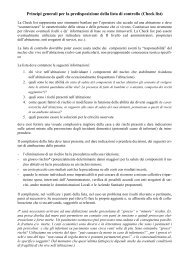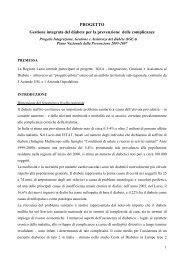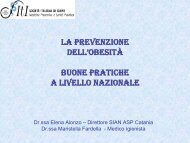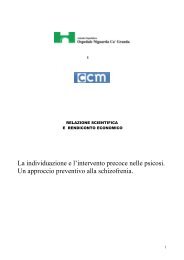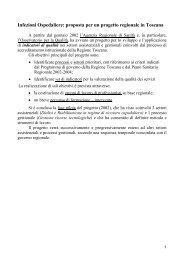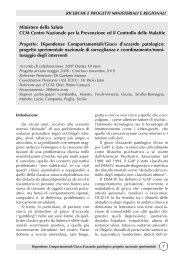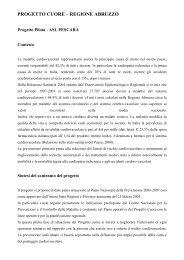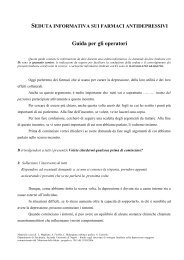Gaining health : analysis of policy development in European ...
Gaining health : analysis of policy development in European ...
Gaining health : analysis of policy development in European ...
Create successful ePaper yourself
Turn your PDF publications into a flip-book with our unique Google optimized e-Paper software.
period <strong>of</strong> the programme, while others are budgeted on<br />
an annual basis. The HCSP stresses the need for long-term<br />
budget<strong>in</strong>g. In its latest report (3), it argues that the chang<strong>in</strong>g<br />
pattern <strong>of</strong> disease from <strong>in</strong>fectious to noncommunicable and<br />
chronic diseases makes new f<strong>in</strong>ancial mechanisms necessary.<br />
While short-lived <strong>in</strong>fectious diseases require short-term<br />
measures, nowadays long-term strategies are needed for<br />
NCD <strong>policy</strong> based on long-term budget<strong>in</strong>g.<br />
3.3. Information and research<br />
Information on <strong>health</strong> status and programme evaluation is<br />
traditionally provided by public <strong>in</strong>stitutes. INPES, INSERM,<br />
INCa, InVS and regional bodies collect <strong>in</strong>formation regularly,<br />
l<strong>in</strong>ked either to specific projects (such as the WHO MON-<br />
ICA Project or to general surveys on the <strong>health</strong> behaviour<br />
and status <strong>of</strong> the population (such as the Health Barometer<br />
<strong>of</strong> INPES published every five year). The regularly published<br />
reports <strong>of</strong> HCSP are an excellent source <strong>of</strong> <strong>in</strong>formation,<br />
conta<strong>in</strong><strong>in</strong>g collated key data not only on the overall public<br />
<strong>health</strong> situation <strong>in</strong> France but on <strong>health</strong> status and behaviour<br />
as well.<br />
The Public Health Act <strong>of</strong> 2004 took a step towards systematic<br />
data collection by sett<strong>in</strong>g comprehensive and clear<br />
<strong>in</strong>dicators that are measured regularly. Two years after the<br />
Act entered <strong>in</strong>to force, a thorough report was published,<br />
with contributions from a number <strong>of</strong> <strong>in</strong>stitutes, government<br />
bodies and <strong>in</strong>surance funds, to explore the possibilities <strong>of</strong><br />
achiev<strong>in</strong>g the 100 objectives by 2008 (28).<br />
Scientific research <strong>in</strong> the field is partly the realm <strong>of</strong> public<br />
<strong>health</strong> <strong>in</strong>stitutes such as INSERM and partly that <strong>of</strong> the<br />
universities. It is felt that epidemiological research is excessively<br />
dom<strong>in</strong>ant <strong>in</strong> France and that the social sciences are<br />
not well represented <strong>in</strong> public <strong>health</strong> research. Nevertheless,<br />
excellent report was published <strong>in</strong> 2007 by the Institute<br />
for Research and Documentation <strong>in</strong> Health Economics on<br />
the results <strong>of</strong> a general population survey on psychosocial<br />
resources and <strong>health</strong> <strong>in</strong>equalities <strong>in</strong> France (29).<br />
To step up research and make it more multidiscipl<strong>in</strong>ary, the<br />
Government has suggested the creation <strong>of</strong> a new <strong>in</strong>stitute<br />
aimed at coord<strong>in</strong>at<strong>in</strong>g scientific public <strong>health</strong> research <strong>in</strong><br />
France. However, experts doubted the real need for such<br />
an <strong>in</strong>stitute and feared that it would lead to greater fragmentation<br />
<strong>of</strong> capacities and resources. It was po<strong>in</strong>ted out<br />
that INSERM, for example, with its strong team <strong>of</strong> experts<br />
<strong>in</strong> the social sciences, would be <strong>in</strong> the position to cover a<br />
broad perspective <strong>of</strong> public <strong>health</strong> research. On the other<br />
hand, some argued that a new <strong>in</strong>stitute would be justified if<br />
it focused specifically on <strong>health</strong> promotion research, which<br />
is chronically underrepresented <strong>in</strong> France.<br />
3.4. Tra<strong>in</strong><strong>in</strong>g<br />
Public <strong>health</strong> and <strong>health</strong> promotion tra<strong>in</strong><strong>in</strong>g <strong>in</strong> France<br />
reflects the typical characteristics <strong>of</strong> the French higher education<br />
system and public <strong>health</strong> structures. Tra<strong>in</strong><strong>in</strong>g focuses<br />
on the education <strong>of</strong> pr<strong>of</strong>essional public <strong>health</strong> adm<strong>in</strong>istrators<br />
<strong>in</strong> the field <strong>of</strong> public <strong>health</strong> and fosters the medicalized<br />
focus <strong>of</strong> public <strong>health</strong>.<br />
In pr<strong>in</strong>ciple, there are three types <strong>of</strong> educational centre<br />
for studies <strong>in</strong> public <strong>health</strong>. First, faculties <strong>of</strong> medic<strong>in</strong>e at all<br />
universities <strong>of</strong>fer public <strong>health</strong> courses with<strong>in</strong> the framework<br />
<strong>of</strong> the basic, obligatory tra<strong>in</strong><strong>in</strong>g at graduate level to all<br />
students. In addition, some departments <strong>of</strong> law and <strong>of</strong> social<br />
and economic sciences <strong>in</strong>tegrate public <strong>health</strong> courses <strong>in</strong>to<br />
their curricula as well.<br />
Second, specialized studies <strong>in</strong> public <strong>health</strong> are organized at<br />
some faculties <strong>of</strong> medic<strong>in</strong>e for students who have accomplished<br />
their basic courses. Students who completed the<br />
specialized studies obta<strong>in</strong> a f<strong>in</strong>al diploma <strong>of</strong> “Medical Expert<br />
<strong>in</strong> public Health”. Some 15 universities <strong>in</strong> France <strong>of</strong>fer specialized<br />
public <strong>health</strong> studies at faculties <strong>of</strong> medical sciences.<br />
Third, the National School <strong>of</strong> Public Health (ENSP) was<br />
founded <strong>in</strong> 1945 <strong>in</strong> Rennes <strong>in</strong> northwest France to provide a<br />
masters degree <strong>in</strong> public <strong>health</strong>. ENSP is not research-based<br />
but rather a public adm<strong>in</strong>istration school where courses<br />
Chapter 4<br />
93<br />
Case studies: <strong>policy</strong> <strong>development</strong> <strong>in</strong> countries for tackl<strong>in</strong>g noncommunicable diseases



